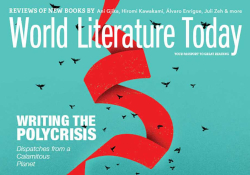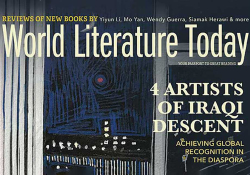Editor’s Note
I write for the future
because my present is demolished.
—Fady Joudah, [. . .]: Poems
 The ellipsis that constitutes the title of Fady Joudah’s latest book of poems, [. . .], might be broken up into its three constituent periods, that smallest of punctuation marks which delimits, terminates, but also, with its spherical shape, we can imagine as the globe in microcosm. Helpfully, the OED points out that the etymology of period—from the Greek περίοδος—invokes circuitousness, revolution, cyclicality, recurrence, even the “orbit of a celestial object.” Do the square brackets on either side of that ellipsis, then, represent violent attempts to stop such perpetual motion? Or merely one way of signaling, editorially, that the ellipsis is a deliberate gap in the citation, a way of pointing to, while also eliding, the lacuna of another text?
The ellipsis that constitutes the title of Fady Joudah’s latest book of poems, [. . .], might be broken up into its three constituent periods, that smallest of punctuation marks which delimits, terminates, but also, with its spherical shape, we can imagine as the globe in microcosm. Helpfully, the OED points out that the etymology of period—from the Greek περίοδος—invokes circuitousness, revolution, cyclicality, recurrence, even the “orbit of a celestial object.” Do the square brackets on either side of that ellipsis, then, represent violent attempts to stop such perpetual motion? Or merely one way of signaling, editorially, that the ellipsis is a deliberate gap in the citation, a way of pointing to, while also eliding, the lacuna of another text?
In his review of [. . .] that leads off this issue’s review section, Matthew Shenoda writes that the “reminder of recurrence is an essential conceit” of the book. “While many will read Joudah’s text as an indictment of this moment,” he writes, “it is equally important to understand it as an articulation of a continuum of violence that long predates this moment.” More than seventy-five years after the Nakba, and as the reciprocal massacres between Israel and Hamas rage on, such violence marks less a continuum along a line than a self-perpetuating cycle of horror that continually swallows its own tail. “While we are faced with poems that will resonate with our deepest sense of humanity and morality,” Shenoda writes, “poems for children dead that will haunt us and cause us to question the order and priorities of the world we embody, there is in these poems a necessary and often beautiful weight that emphasizes human interaction both with one another and with the larger world.” Yet to many, right now, words like humanity, morality, order, and beauty must taste like ash in the mouth.
In a recent New Yorker essay, Zadie Smith writes about the “monstrous and brutal mass murder” of more than a thousand Israelis on October 7, 2023, and of more than thirty-five thousand Gazans in the ensuing months (“Shibboleth,” May 5, 2024). What precedes such monstrosity and brutality on both sides, she writes, is that the shibboleths of “language and rhetoric are and always have been weapons of mass destruction.” This applies to both “what can’t be said” and what “must be said.” Ultimately, shibboleths are as much about us—and what remains unspeakable—as they are about the perceived threat embodied by the other.
But what if we imagined “another way to begin”? Can we recuperate words like humanity and beauty? In her essay about storytelling Anna Badkhen asks, “Why do we keep sacrificing the little girl in order to live in love, keep chaining the maiden to the cliff to feed the dragon of our violence?” Can we tell stories “in a way that makes more breathing room, that does not crush humans, not even one, not even a little girl?”
As if in reply, Rachel Tzvia Back offers breathing room with a poem. She originally penned it in response to an essay by Naomi Shihab Nye that appeared in the “Palestine Voices” issue of WLT, in a year (2021) when three holidays of the major monotheistic religions coincided: Eid al-Adha, Shavuot, and Pentecost. In June 2024 Eid al-Adha and Shavuot again occur in close proximity. The former, known as the Feast of Sacrifice, commemorates Abraham’s binding of Isaac, which is told in both the Qur’an and the Hebrew Bible. The latter, known as the Festival of Reaping, recalls the story of Ruth, a Moabite widow who accepts the Israelite people as her own and is given “six measures of barley,” sparing her from the fate of starving to death (Ruth 3:15). In her poem, Back writes: “The next and every harvest will be / buildings become rubble piled high / in the cratered streets where the buried / are all love and hope and we keep // Bringing dust to the dinner table.”
In this issue devoted to horror fiction, the four featured stories explore one way to begin. Yet confronted by the nonfictional horrors of 2024, the elliptical gaps between each period represent the shibboleths of a different sort of sacrifice . . . and hopefully room to breathe.
Daniel Simon









